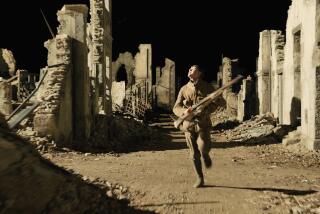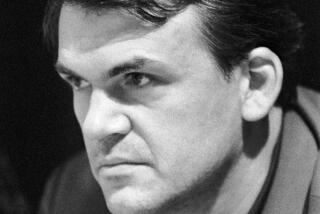CORRESPONDENCE
- Share via
To the editor:
After reading Richard Schickel’s review of my joint biography of Akira Kurosawa and Toshiro Mifune, “The Emperor and the Wolf” (Book Review, July 14), I have to ask the question: Did he even bother to read it? The review suggests very strongly that no, he did not.
He criticizes it for not being a more speculative, interpretive biography, but I point out quite clearly my approach in the book’s introduction. He accuses me of being a “mad fact collector.” (I find this statement singularly peculiar; most readers of biographies, one would hope, prefer facts to rumor and innuendo.) Schickel, clearly, isn’t much for mad fact collecting himself, for his review perpetuates myths (and creates a new one) rather than dispels them.
For example, Mifune was not an “aerial cameraman,” nor was Kurosawa, as Schickel absurdly suggests, “something of an anti-Communist.” The former is dispelled by the compelling comments of Mifune’s oldest and closest friend, with whom he served during the war. If Schickel had even bothered to read the photo captions, he might have learned that. For the latter, Kurosawa was, as they say, a card-carrying member of the Communist Party in his youth, and was later employed by the Soviet government to direct the Oscar-winning “Dersu Uzala” (1975).
Indeed, there are factual errors throughout the review: “The samurai Mifune played for [Kurosawa] were all ronin” (not in “Throne of Blood” and “The Hidden Fortress”); “Mifune worked in middle-class garb ... [in] ‘High and Low’ and ‘The Bad Sleep Well’ ” (no, those were set in a world of ostentatious wealth).
Had my book been an umpteenth monograph of Hitchcock or Ford, one might excuse Schickel’s pettiness. But this is the first English-language biography of either man (not counting Kurosawa’s autobiography, which discusses only his early years and first films). I’d estimate 70% of its content is information never before published in English, including dozens of interviews with collaborators done specifically for this book. Schickel makes broad, sweeping claims about my book, such as “[Galbraith] shovels useless information in lieu of thoughtful insight.” Yet, how insightful is criticism when it’s unsupported by evidence and examples, buttressed by a lazy essay rife with errors?
I don’t pretend the work to be perfect and would indeed welcome useful criticism. However, surely a more professional review is called for--one that, hopefully, acknowledges its attributes (and I’m quite confident that it has many) as well as its shortcomings. This surely, would have been preferable to misinformed petulance.
Stuart Galbraith IV
Los Angeles
*
Richard Schickel replies:
Stuart Galbraith identifies Mifune as “an aerial photographer during World War II” on page 5 of his book (as well as in a photo caption). It is true he did not see combat action in that role, but that was certainly his military job classification. Furthermore, I employ the words “cameraman” and “photographer” interchangeably and have no intention of splitting hairs with Galbraith on this point.
I agree with Galbraith about Mifune’s roles in “Throne of Blood” and “The Hidden Fortress.” I should have made a finer distinction in that passage of my review. But he is, I think, grasping at straws when it comes to “High and Low” and “The Bad Sleep Well.” In the former case Mifune is a man who has risen to some prosperity, but it is established that if he pays the ransom for the kidnapped boy, it will ruin him. In other words, his wealth is new and does not run very deep. In the latter movie, he plays the secretary to an industrialist; he is the servant of wealth, but not, so far as I can see, particularly well-to-do himself.
Whether or not Kurosawa carried a Communist Party card in his youth is irrelevant to the fact that his films far transcend the conventional left-right political continuum and were, of course, frequently criticized by the left. That he made a movie under Soviet auspices is really not germane to this point. “Dersu Uzala” is a historical epic, set in pre-communist Russia, and has nothing to say, even metaphorically, about modern political issues. Galbraith himself says that after a five-year hiatus from production Kurosawa was “desperate” to make a film and obviously did not much care who financed it. In other words, the director probably remained a leftist of some sort, but in my interpretation of his work, he either ignores or implicitly criticizes conventional ideological solutions to life’s problems.
I respect the amount of research that went into “The Emperor and the Wolf.” But the fact remains that Galbraith has done nothing with it that significantly adds to our understanding of his subjects. It is, in essence, an endlessly annotated filmography. I admit that my eyes frequently glazed over as I read it. But read it I did--in frustration and with growing impatience at its lack of ideas or insight.
More to Read
Sign up for our Book Club newsletter
Get the latest news, events and more from the Los Angeles Times Book Club, and help us get L.A. reading and talking.
You may occasionally receive promotional content from the Los Angeles Times.








